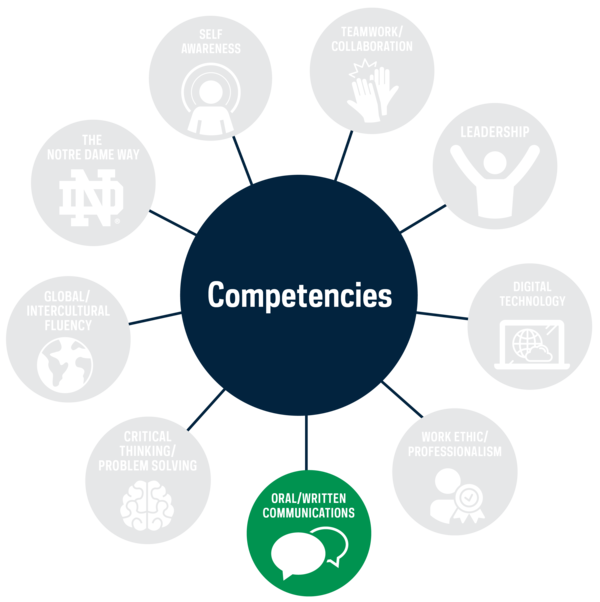Verbal/Written Communication

Verbal/Written Communication
Verbal and written communication is the ability to articulate thoughts and express ideas effectively using oral, written and non-verbal communication skills (to inform, instruct, and persuade), to multiple audiences, as well as to listen for meaning and understanding.
Assessing Your Level of Competency
This is the time to really reflect on yourself and where you are at with this competency. Ask yourself the following questions to dive deep into your self-assessment:
- Can you identify and use the grammatical style guide that is most commonly used in your discipline or field?
- Do you know how to write x, y and z ? e.g. composing a persuasive essay?
- Do others seem to have to often ask you to repeat yourself or clarify your comments when speaking?
- Do others ask clarifying questions in your written communication, or are you clear and concise?
- Can you recognize when enough is enough when writing an email or communication rather than making it longer than necessary? Being brief but specific!
- Do you feel comfortable speaking in front of others?
- Do you ensure your written communications are error free before submitting?
- The flip side of communicating is listening, do you truly listen when others are speaking?
- Do you take the time to think before you speak?
Building Your Level of Competency
Build on your level of this competency through the following:
- Work with tutors at the Writing Center to strengthen your writing skills.
- Ask faculty for feedback and tips on your writing.
- Proofread online and written communication to avoid errors, keeping your audience in mind.
- Attend a CUSE workshop on “Writing a Strong Grant Proposal."
- Look for opportunities to share your work at conferences and departmental events, e.g., poster presentations.
- Take a class that emphasizes speaking extemporaneously.
- Build digital communications skills, including PPT or similar program.
- Develop and deliver a presentation for a class.
- Check for understanding when speaking with others by asking clarifying questions.
- Conduct informational interviews.
- Develop a strong professional online presence on Handshake and LinkedIn.
- Create professional job search documents such as resumes and cover letters.
- Join the campus Toastmasters group
- Modify your 30-second professional introduction (elevator pitch/self-introduction) for different audiences--types of employers, e.g. or to ask about joining faculty research.
- Attend networking events and employer information programs and talk to at least three new people at each event.
- Practice interviewing/speaking skills with Big Interview.
Communicate this Competency
Your communication skills will be on display throughout the application process--your cover letter, resume and follow-up notes as well as your interviewing skills are all ways you communicate with potential employers. That's why it's essential to develop your job search skills. Consider first any opportunities you have had to utilize these communication skills:
| Proficient at business analysis | Communicate clearly verbally |
Communicate clearly in writing |
| Speak to new people easily | Communicate creatively | Define |
| Proficient at editing/restatement | Write in an expository manner |
Facilitate meetings/groups |
| Persuade other | Summarize information |
Perform technical writing |
Then start with statements like the samples below to build upon:
Class Project: Initiated collaborative relationship with local nonprofit to develop assessment of client needs
Internship: Prepared and delivered presentation on lab results for Principal Investigator and graduate student researchers
Student organization: Developed a social media campaign for the robotics club, increasing membership by 150%.
Service: Taught conflict resolution skills to local middle and high school students using Take Ten curriculum.
Job: Provided excellent customer service, assisting customers with locating items and recommending materials for projects.
Career Ready Competency Tracking Tool
Download the Career Ready Competency Tracking Tool one time from the main Career Competencies webpage, and utilize one document to track the development of all your competencies.